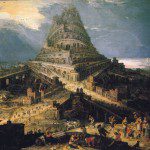Chaucer, of course, had relatively little use for nostalgia as such—he would have remembered the Black Death from his youth. But the broader Christian (we might even say ancient-medieval) position ought to be clearer now. We might sum it up as: things have always been bad; there has only been one “former age.” Everything afterwards is fallen-ness and struggle.
This may seem a simple enough point. But as a medievalist, I see this all the time: the romanticization of past times and peoples, as if the medievals and ancients were running around rosy-cheeked and confident in objective truth without batting an eye. I am reminded of my friend Rick Yoder’s review of the Benedict Option (it is well worth checking out; one of the best I have read):
If Dreher generally fetishizes the Middle Ages, he commits the opposite sin in his treatment of modernity. He sees only the negative. Dreher’s readers would be forgiven for forgetting that, in fact, the Church has endured and ameliorated the conditions of modern life for 500 years, and that it has given the world innumerable saints during that time. Leaving aside Church history, I’ve already mentioned that Dreher omits the various emancipatory struggles of the 19th and 20th centuries. Why? Perhaps because it troubles his claim that we have arrived at a uniquely bad moment for the Church, a time in which there is essentially nothing to be gained from the culture at large.
Rod Dreher aside, this is effectively the problem of nostalgia: now bad, before good, and because before was good we have to find a way back. The Christian response: always pretty bad, but with the grace and goodness of creation creating a bedrock of goodness upon which all the struggle rests; history is the working out of that struggle, and it takes intense reflection to determine precisely which periods can lay claim to descriptions like “better” and “worse,” if any can.
But why is it that contemporary Christians are so vulnerable to this; how is that we forget this so easily? Here it is Elizabeth Stoker Bruenig’s review of the Benedict Option that might help us (also a lovely and worthwhile review of the book):
There never will be another Medieval subject. All of us in the Anglophone world see with liberal eyes and hear with liberal ears, and to some degree think with liberal minds: Indeed, the lament that we’re no longer Medieval is a comically typical liberal refrain (think of the Romantics, with their Gothic revivalism, or the pre-Raphaelites, with their knights in shining armor). The will to be Medieval subjects again is the desire to return to an age of faith, but this is not an option.
There’s your answer: “nostalgia” is a liberal sentiment, a post-Enlightenment notion. No wonder it wasn’t coined until the 17th century (and was considered a disease for some time, as the world adjusted its beliefs and liberalism gained traction). The medievals thought things were always going to get worse before they got better; we needn’t be so sure of that, but we ought not be nostalgic.
It’s rather clear, however, that nostalgia won’t just go away; as liberal subjects, we can’t expect that. But self-consciousness shifts and reformulates itself based on its understanding of itself and the world around it; in other words, recognizing that nostalgia has little place in the Faith is a first step, a first step in truly reckoning with our times, actively fighting for a Christian future, rather than acting as if there is some past to be returned to, a chasuble or political system to be dug out of the cold, hard ground.













